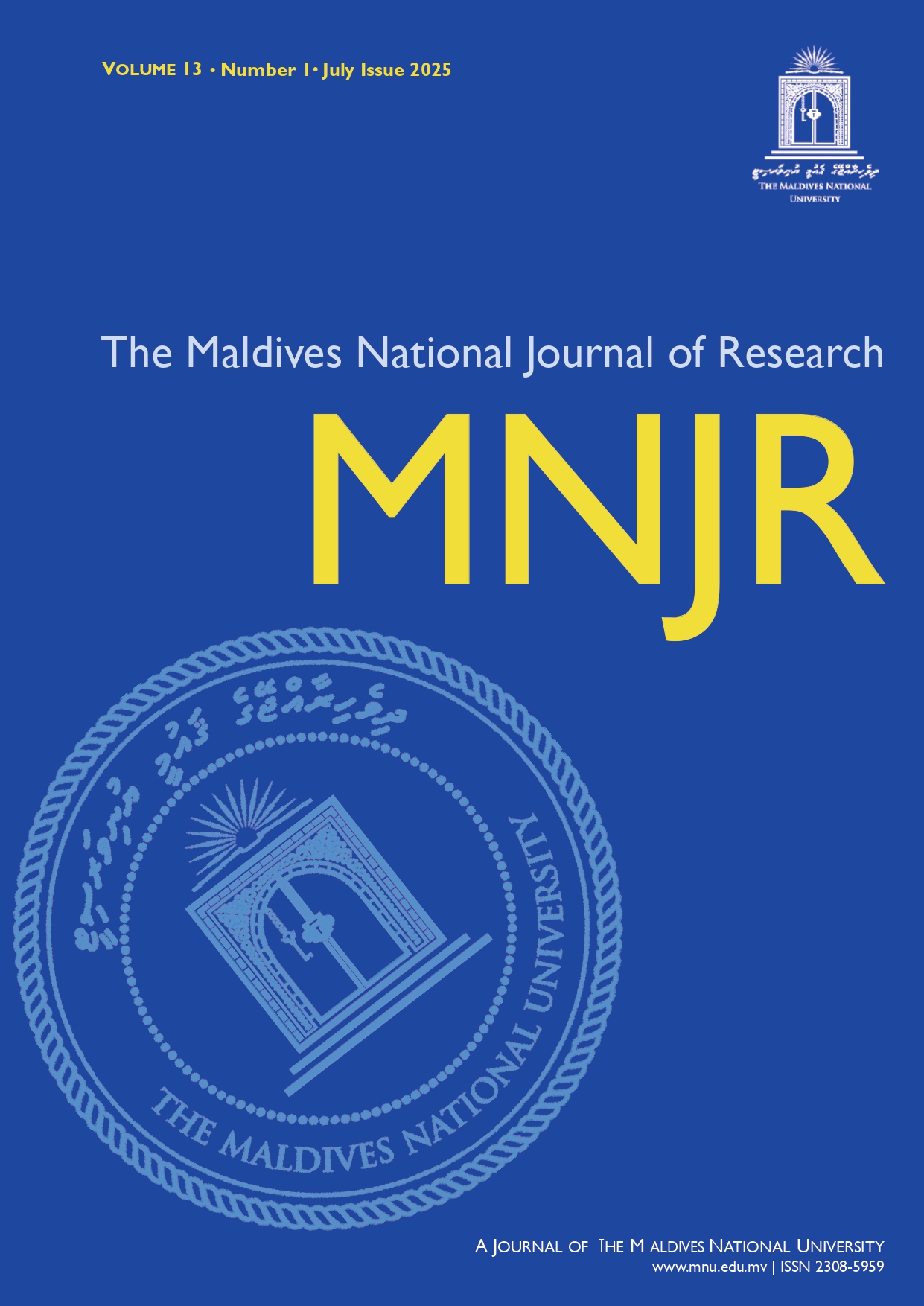Exploring Tourism Diversification: The Case of the Maldives
DOI:
https://doi.org/10.62338/7fc3mv68Keywords:
Coastal tourism, Ecotourism, Maldives, Tourism diversification, Wellness tourismAbstract
In 2023, the Maldives was named the world’s leading travel destination for the fourth consecutive year, owing to its outstanding natural attractions. Consequently, Maldives’ Fifth Tourism Master Plan sets a new vision to lead the world in sustainable tourism, provide the best visitor experiences, and achieve a $6 billion annual international tourism target by 2027. This research primarily aimed to investigate the feasibility of tourism diversification in the Maldives. The specific objectives were: (i) to assess the level of confidence among tourism industry stakeholders regarding the geographical dispersion of tourism in the Maldives, and (ii) to identify key bottlenecks and recommend strategies to support successful tourism diversification. The research sample consisted of 30 tourism industry professionals and policymakers in the Maldives. Data were collected through surveys, interviews, and the analysis of secondary sources, such as government reports, industry publications, and academic literature. The collected data were analysed using SPSS, and NVivo. The findings offer valuable insights into tourism diversification in the Maldives, focusing on areas such as investment, marketing, skills development, and stakeholder collaboration. The study concludes that tourism diversification is viable, with new segments such as eco-tourism, coastal tourism, and wellness tourism enhancing competitiveness, broadening appeal, and fostering industry growth. It suggests short, medium, and long-term strategies to address the challenges identified, including infrastructure gaps, environmental sustainability, sociocultural impacts, and human resource skill shortages. However, success will require collaboration among all stakeholders, including the government and local communities, to address bottlenecks and implement the recommended mitigation strategies. This research contributes to a better understanding of tourism diversification in small island nations. Further research is needed to identify specific actions by stakeholders and mechanisms required for implementing the diversification strategies.
References
Airey, D. (2020), “Education for tourism: a perspective article”, Tourism Review, 75(1), 260-262. https://doi.org/10.1108/TR-02-2019-0074
Ali, A., Elisabetta, G., Macrina, M., & Thiam Hee, N. (2023). Open for Business: How Maldives Overcame the COVID-19 Crisis, Asian Development Bank. Philippines. Retrieved from https://policycommons.net/artifacts/10880529/ open-for-business/11758430/ on 06 Aug 2024. CID: 20.500.12592/sxksrqb. http://dx.doi.org/10.22617/BRF230584-2
Buckley, R. (2021), “Is adventure tourism therapeutic?”, Tourism Recreation Research, 46(4), 553-557. https://doi.org/10.1080/02508281.2021.1931775
Buhalis, D., Leung, X. Y., Fan, D., Darcy, S., Chen, G., Xu, F., Tan, G. W., Nunkoo, R., & Farmaki, A. (2023). Editorial: Tourism 2030 and the contribution to the sustainable development goals: the tourism review viewpoint”, Tourism Review, 78(2), 293-313. http://dx.doi.org/10.1108/TR-04-2023-620
Cerri, F., Louis, Y. D., Fallati, L., Siena, F., Mazumdar, A., Nicolai, R., Zitouni, M. S., Adam, A. S., Mohamed, S., Lavorano, S., & Galli, P. (2024). Mangroves of the Maldives: a review of their distribution, diversity, ecological importance and biodiversity of associated fora and fauna”, Aquatic Sciences, 86:44, 1-123. https://doi.org/10.1007/s00027-024-01061-2
Creswell, J. W., & Clark, V. L. P. (2007). Designing and conducting mixed methods research. Sage Publications, Inc.
Dai, Y. D., Huang, F.-H., Chen, K.-Y., Chen, W. J., & Huan, T. C. (2022), “Recreational scuba diving as a special form of tourism: lessons from Taiwan”, Tourism Review, 79(3), 757-779. https://doi.org/10.1108/TR-11-2020-0547
Kaushal, V. & Yadav, R. (2024). “Exploring luxury hospitality customer experience of Maldives tourists amidst COVID-19 pandemic”, Consumer Behavior in Tourism and Hospitality, 19(1), 140-165. https://doi.org/10.1108/CBTH-04-2022-0085
Lau, C.K., Fan, D.X., Milne, S., Qiu, H., & Sun, M. (2019), “Chinese venturers to pacific small island developing states: travel and lifestyle”, International Journal of Tourism Research, 21(5), 665-674.
Ministry of Finance, Maldives. (2024). URL: Ministry of Finance. Accessed 20.06.24.
Ministry of Tourism, Fifth Tourism Master Plan. (2023). URL: https://www.tourism.gov.mv/dms/document/4969b4831928f1bdf3506340fb6974fc.pdf. Accessed 22.05.24.
Melli, C., Malatesta, S., & Tosi, S. (2024). Sport on Maldivian Islands. At the Intersection of Tourism, Development, and Power Relations.
In: Van Rheenen, D., Naria, O., Melo, R., Sobry, C. (eds) Sport Tourism, Island Territories and Sustainable Development. Sports
Economics, Management and Policy, 24(1). Springer, Cham. https://doi.org/10.1007/978-3-031-51705-1_26
Nautiyal, R. & Shaheer, I. (2022) World’s First Destination Loyalty Programme – Will It Work?, Tourism Case Studies. https://doi.org/10.1079/tourism.2022.0022
Neuman, W. L. (2006). Qualitative and Quantitative Approaches, Edinburgh: Pearson Education.
Sekaran, U. & Bougie, R. (2020). Research Methods For Business: A Skill Building Approach (8th ed.). Hoboken: Wiley.
Shakoor, I. A. (2020). The tourism industry of the Maldives, - have we gone beyond ‘regulatory capture’? The Maldives National Journal of Research. 8(1), August 2020, 213-227.
Sheldon, P. (2022), “Regenerative tourism”, in Buhalis, D., (Ed.), Encyclopedia of Tourism Management and Marketing, Cheltenham and Northampton, MA: Edward Elgar Publishing.
UNWTO (2022), “Impact Assessment of the COVID-19 Outbreak on International Tourism”, URL: https://www.unwto.org/impact-assessment-of-the-covid-19-outbreak-on-international-tourism Assessed 05.06.24.
UNWTO (2024), Global and regional tourism performance. URL: https://www.unwto.org/tourism-data/global-and-regional-tourism-performance. Assessed 09.06.24.
Weidenfeld, A. (2018). Tourism Diversification and Its Implications for Smart Specialisation. Sustainability. 2018, 10, 319; doi:10.3390/su10020319.
World Bank (2024). Maldives Development Update, May 2024: Scaling Back and Rebuilding Buffers. © Washington, DC: World Bank. http://hdl.handle.net/10986/41525 License: CC BY-NC 3.0 IGO.



